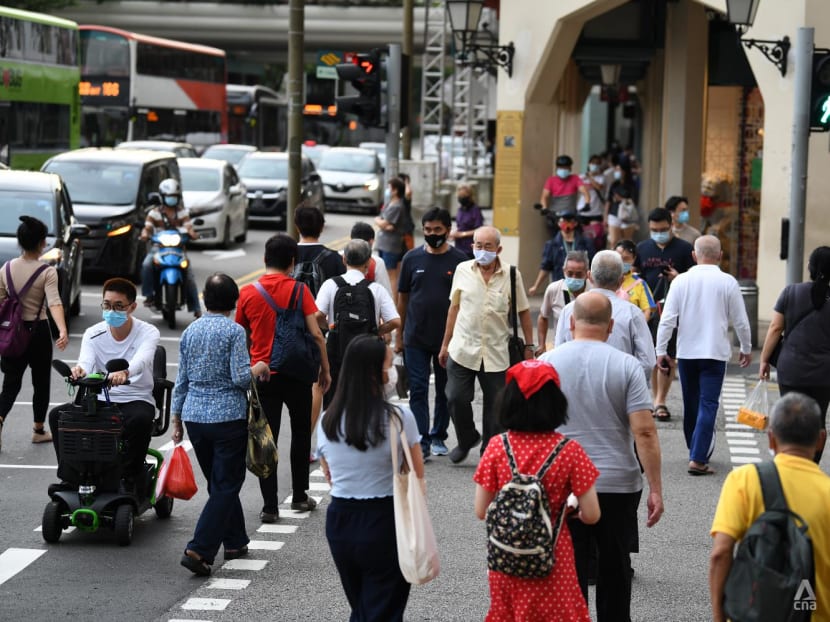Singapore hopes to ride through Omicron wave with measures tightened only as 'last resort'
Once COVID-19 cases start to rise steeply, Singapore could see 3,000 Omicron infections within a couple of weeks, says Ong Ye Kung.

Pedestrians wearing face masks cross a street in Chinatown on Nov 17, 2021. (File Photo: CNA/Calvin Oh)
SINGAPORE: The current COVID-19 measures will only be tightened as a "last resort" when Singapore's healthcare system is under heavy strain, said Health Minister Ong Ye Kung in Parliament on Monday (Jan 10).
"It is the (multi-ministry task force’s) hope that we can ride through the Omicron wave with the current safe management measures," he said in response to questions on whether stricter rules will be put in place.
"If we have to tighten the restrictions, it will be as a last resort when our healthcare system is under severe pressure."
The task force had earlier said that the existing rules, such as limiting group sizes to five people, will remain during the Chinese New Year period.
Citing Singapore's experience with the Delta wave last year, Mr Ong also noted that even after it subsided, authorities had refrained from "being too jubilant" and over-relaxing restrictions. "That would have been a mistake," he said.
LARGER OMICRON WAVE EXPECTED
Singapore can expect an infection wave “several times larger” than the one caused by Delta, said Mr Ong, citing the Omicron variant's higher transmissibility.
“If Delta infections reached a sustained incidence of about 3,000 cases a day, Omicron could perhaps reach 10,000 to 15,000 cases a day, or more.
“Cases are likely to double every two to three days. So once cases start to rise steeply, within a couple of weeks, we may see 3,000 Omicron cases a day.”
But Mr Ong also pointed to global studies that have shown that the Omicron variant causes less severe illness than Delta – with fewer cases being admitted to hospital or requiring emergency care.
“This has also been borne out by our own experience. In Singapore, we have recorded 4,322 Omicron infections so far, including 308 seniors aged 60 and above," he said.
“Eight needed oxygen supplementation and all of them have been taken off oxygen after a short few days. None required ICU care as yet.”
If these infections had instead been caused by Delta, authorities would expect 50 to 60 patients needing oxygen supplementation, ICU care or to die, he added.
But Mr Ong cautioned that Singapore must be careful in interpreting these observations, as “it is early days and the circumstances of each country are different”.
BALANCE BETWEEN THREE FACTORS
In the fight against the pandemic, vaccinations, expansion of healthcare capacity and safe management measures must “work in tandem”, with a balance being struck between the three factors, Mr Ong said.
“We cannot over-liberalise, remove all social restrictions, let infections rise uncontrollably and leave the healthcare system to bear the consequences," he added.
“Neither will we protect the healthcare system at all cost, go for a zero-COVID strategy, and lock down our borders and society which will cause tremendous suffering to our people."
But he noted that assessing the interplay of the factors will be a “matter of judgment depending on the pandemic situation”.
It would be too rigid to set metrics to trigger social restrictions, he said, as authorities must respond flexibly to “twists and turns” of the situation.
In the meantime, he noted progress on the uptake of vaccinations and booster shots, with more than 90 per cent of every eligible age group already vaccinated. About 46 per cent of the population have received their booster jabs.
Healthcare capacity also continues to be enhanced, he said - with up to 350 ICU beds, 2,000 isolation beds and 4,000 community treatment facility beds for COVID-19 cases ready "with a couple of weeks’ notice".
While manpower is "always a limiting factor", staff strength for intensive care units has increased by 12 per cent over the past year to 1,800 members, he said. In addition, about 500 more workers have been, or are being trained to assist with these operations.
Ultimately, although Omicron is a "different enemy", Mr Ong noted that Singapore is much better prepared and more resilient than before.
"And after the Omicron wave passes, which it will, we would have taken another huge step towards living with COVID-19," he added.
BOOKMARK THIS: Our comprehensive coverage of the COVID-19 pandemic and its developments
Download our app or subscribe to our Telegram channel for the latest updates on the coronavirus pandemic: https://cna.asia/telegram









